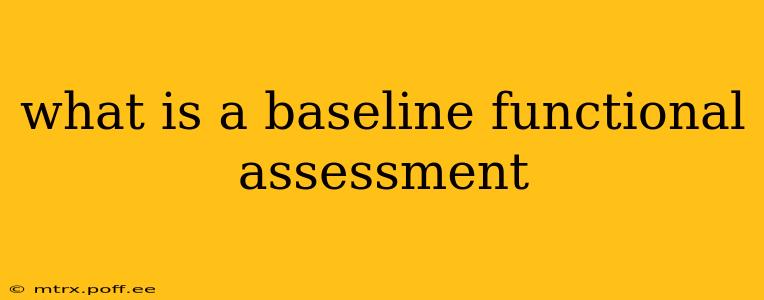A baseline functional assessment is a comprehensive evaluation of an individual's abilities and limitations in performing everyday tasks. It serves as a starting point to track progress, measure the effectiveness of interventions, and inform care planning. Think of it as a snapshot of a person's current functional status, providing a benchmark against which future changes can be compared. This is crucial in various settings, including healthcare, rehabilitation, and social work.
What does a baseline functional assessment involve?
A baseline functional assessment typically covers a broad range of activities, encompassing physical, cognitive, and psychosocial aspects of daily life. Specific areas assessed can vary depending on the individual's needs and the setting, but often include:
-
Activities of Daily Living (ADLs): These are basic self-care tasks essential for independent living. Examples include bathing, dressing, toileting, eating, and transferring (moving from bed to chair, etc.). The assessment determines the level of assistance, if any, required to perform these tasks.
-
Instrumental Activities of Daily Living (IADLs): These are more complex tasks that contribute to independent living but are not essential for survival. Examples include managing finances, preparing meals, using transportation, shopping, housekeeping, and managing medications.
-
Mobility and Balance: This assesses the individual's ability to move safely and independently, including walking, standing, sitting, transferring, and maintaining balance. This might involve observing gait, assessing range of motion, and testing balance reactions.
-
Cognitive Function: This area explores cognitive abilities like memory, attention, problem-solving, and decision-making. Tests may include simple recall tasks, verbal fluency assessments, or more complex cognitive evaluations depending on the suspected impairment.
-
Communication: This looks at the individual's ability to effectively communicate their needs and understand others. It might assess verbal and non-verbal communication skills.
-
Social Participation: This examines the individual's ability to engage in social activities and maintain relationships.
-
Mental Health: This considers the presence of any mental health conditions that could impact functional abilities.
Who conducts a baseline functional assessment?
The specific professional conducting the assessment depends on the individual's needs and the setting. Common professionals include:
- Occupational Therapists (OTs): Focus on the individual's ability to perform daily tasks and adapt their environment.
- Physical Therapists (PTs): Concentrate on mobility, strength, and balance.
- Registered Nurses (RNs): Often assess ADLs and IADLs as part of a patient's overall care plan.
- Social Workers: May conduct assessments focused on social participation and support needs.
- Geriatric Care Managers: Often coordinate assessments performed by different professionals.
What are the purposes of a baseline functional assessment?
The baseline functional assessment serves several critical purposes:
- Establishing a baseline: Provides a clear picture of the individual's current capabilities.
- Identifying needs: Highlights areas where the individual requires assistance or support.
- Developing a care plan: Informs the development of individualized interventions and support strategies.
- Measuring progress: Allows for tracking changes in functional abilities over time, demonstrating the effectiveness of interventions.
- Determining eligibility for services: Often used to determine an individual's eligibility for specific services or programs.
- Facilitating communication: Provides a common language for communication between healthcare professionals and caregivers.
How often is a baseline functional assessment repeated?
The frequency of reassessment depends on the individual's condition and the need for ongoing monitoring. A baseline assessment may be repeated:
- Regularly: At scheduled intervals, such as monthly, quarterly, or annually, to track progress and make necessary adjustments to the care plan.
- After significant changes: Following a hospitalization, illness, or injury to identify any functional changes.
- As needed: When there is a concern about a decline in functional abilities.
What tools are used for a baseline functional assessment?
Various tools and standardized assessments are used, depending on the individual's needs and the professional conducting the assessment. Some examples include the Barthel Index, the Katz Index of Independence in Activities of Daily Living, the Functional Independence Measure (FIM), and the Mini-Mental State Examination (MMSE).
This comprehensive overview provides a clearer understanding of baseline functional assessments, their components, application, and importance in various care settings. Remember, this information is for educational purposes and does not substitute for professional medical advice.
